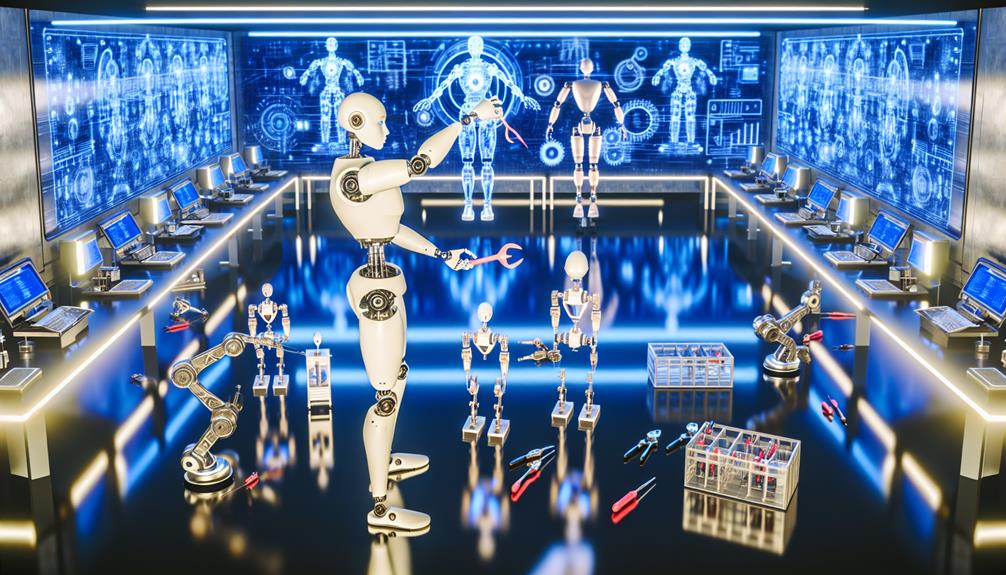
As a modern-day gold rush, the surge in demand for AI and ML expertise is akin to prospectors seeking fortune; only now, the gold is digital, and you’re the prospector equipped with algorithms instead of a pickaxe.
You’ve likely heard the buzz about the transformative power of AI and ML in the workforce, but what does that mean for you? Consider this: with AI set to create 2.3 million jobs by 2023, your career path could be one of these lucrative and innovative trails just waiting to be charted.
Whether you’re drawn to the intricate problem-solving of a machine learning engineer, the data-driven insights of a scientist in the field, or the strategic vision of an AI product manager, there’s a role that not only fits your skill set but also challenges you to grow.
So, let’s unravel the map together and uncover the paths that could lead you to be an influential part of this technological frontier—after all, the journey is as exciting as the destination, and who knows where your next step might lead?
Key Takeaways
- Machine Learning and AI engineering roles include machine learning engineers, AI engineers, ML scientists, and ML consultants.
- Data science opportunities involve interpreting complex data, developing algorithms and predictive models, and proficiency in programming languages, statistical analysis, and machine learning.
- AI in robotics careers involve designing and implementing AI algorithms for robotic systems, developing software for robots, and tackling challenges in machine learning and computer vision.
- Natural language processing pathways involve crafting AI models that can process text and speech, proficiency in programming and linguistic understanding, and creating systems for sentiment analysis and language translation.
Emerging AI Career Landscapes
As AI reshapes industries, a multitude of career paths are emerging for professionals eager to harness its potential. You’re now at a thrilling crossroads where traditional jobs blend with futuristic possibilities. The job outlook for AI careers is robust, with artificial intelligence jobs permeating sectors from healthcare to finance.
Diving into data science, you’ll find yourself at the heart of AI, turning raw data into insights. If you’re more inclined towards creation and innovation, becoming a machine learning engineer might be your calling. Here, you’ll design algorithms that teach computers to learn from and act on data. For those fascinated by automated systems, a career as a robotics engineer could be the perfect fit, integrating AI into machines that can perform complex tasks.
AI engineering is no walk in the park; it’s a field where the skills required are as diverse as they’re rigorous. Your arsenal should include a solid understanding of programming, statistics, and problem-solving. A career in AI might also lead you into AI research, pushing the boundaries of what machines can do.
Whichever path you choose, staying current with the latest AI advancements is key. Your journey into AI careers promises a landscape where innovation is constant, and the opportunities are as boundless as the technology itself.
Machine Learning Engineer Roles

Building on your interest in AI innovation, exploring the role of a Machine Learning Engineer can offer a direct path to shaping the future of technology. As a machine learning engineer, you dive into complex data sets to identify patterns and insights that drive innovation. You’re not just a coder; you’re a creator, using your bachelors degree in computer science as a springboard to build predictive models that can transform industries.
Here’s what you can expect to do in this dynamic role:
- Implement machine learning techniques using programming languages like Python or R to develop efficient algorithms.
- Utilize deep learning frameworks, such as TensorFlow or PyTorch, to enhance the capabilities of neural networks.
- Apply natural language processing to analyze and interpret human language within vast amounts of data.
- Engage in software development practices to integrate machine learning models seamlessly into larger systems.
- Research and deploy learning algorithms that enable machines to learn from data autonomously.
Becoming a machine learning engineer means you’re at the forefront of AI application, using your expertise to influence how technology understands and interacts with the world around us. Your contribution is pivotal, as every line of code and every model fine-tuned can revolutionize the way we live and work.
Data Science Opportunities

The surge in demand for data science jobs, boasting a 31% increase recently, presents lucrative and varied career opportunities across multiple industries. You’ll find that data science merges deep analytical skills with technical prowess, as you interpret complex data to inform strategic decisions. With your experience in machine learning and data analytics, you could become an invaluable asset in fields ranging from healthcare to retail, where professionals like you’re sought after to harness raw data and create AI-driven solutions.
Big data engineers and data scientists are just some of the roles you might explore. These positions offer competitive salaries and the chance to work on the cutting edge of technology. Your data science experience will be vital in developing algorithms and predictive models that can, for instance, forecast market trends or improve patient outcomes.
If you’re interested in these data-driven challenges, you’ll need to be proficient in programming languages, statistical analysis, and, of course, machine learning. The path isn’t easy, but it’s incredibly rewarding. Continuous learning is key, as AI advancements are ceaseless. Embrace the journey, for the opportunities in data science are vast and the impact of your work profound.
AI in Robotics Careers

While your data science skills lay the foundation for interpreting complex information, a career in AI Robotics will see you applying that knowledge to create intelligent machines that can operate autonomously. As you delve into robotics engineering, you’ll be at the forefront of designing and programming robots and robotic systems that can improve lives and revolutionize industries.
By merging your programming skills with an understanding of robotics, you’ll help engineers build sophisticated AI systems. If you’re considering a path in this field, it’s beneficial to have a degree in computer science or a related engineering discipline. As AI engineers or robotics engineers, you’ll play a pivotal role in shaping the future of technology and artificial intelligence careers.
Here’s what you can expect:
- Designing and implementing AI algorithms for robotic systems.
- Developing software that enables robots to process and react to their environment.
- Collaborating with cross-functional teams to innovate and improve robotic capabilities.
- Tackling challenges in machine learning, computer vision, and sensor integration.
- Contributing to groundbreaking work in industries ranging from healthcare to space exploration.
In the realm of AI in Robotics, your passion for technology and innovation can lead to a fulfilling and impactful career.
Natural Language Processing Pathways

Embarking on a career in Natural Language Processing (NLP) means you’ll be at the heart of developing AI that understands and interprets human language. As an NLP engineer, you dive into the complexities of human communication, crafting AI models that can process text and speech with remarkable accuracy.
Your journey starts with a solid foundation in Artificial Intelligence (AI) and machine learning. You’ll likely have a computer science degree under your belt, complemented by skills honed through projects and experience. Learning engineers and data specialists are part of your tribe, as you navigate large datasets to train and refine your models.
You’re not just a software engineer; you’re a specialist who blends technical and analytical acumen to create systems capable of sentiment analysis, language translation, and more. The tools you develop are crucial in a world increasingly reliant on AI to parse the avalanche of data generated every second.
To thrive, you’ll need to be proficient in programming, understand linguistic nuances, and be ready to tackle the ever-evolving challenges of machine learning. Your role is pivotal in bridging the gap between human language and the digital minds that seek to understand it.
Frequently Asked Questions
Which Is the Most Demanded AI Career?
You’re likely to find the most demand in careers like AI Ethics, AI Product Manager, and Machine Learning Research, with Robotics Engineer and Computer Vision also seeing significant growth.
Which Industry Uses AI ML the Most?
You’re witnessing a revolution as healthcare analytics and financial forecasting harness AI/ML the most. Autonomous vehicles and retail personalization follow, transforming manufacturing optimization and even agriculture automation with entertainment algorithms and ed-tech innovations.
What Jobs Are Most Exposed to Ai?
You’ll find jobs in healthcare, education, and manufacturing highly exposed to AI, facing challenges like automation displacement, ethics, and the need for job redesign and workforce reskilling for effective human-AI collaboration.
What Is the Highest Salary in AI and Ml?
You’re curious about the peak earnings in AI, right? Well, in roles tackling AI Ethics, Data Privacy, and advanced fields like Neural Networks, salaries can soar above $150,000, especially with AI startups.
Conclusion
As you stand at the crossroads of technology’s frontier, remember that carving out a career in AI and ML isn’t just smart—it’s future-proof.
Like a navigator charting unknown waters, you have the potential to guide industries through data’s deep seas.
Whether you’re building algorithms as a machine learning engineer, deciphering data’s story, or shaping the future with AI in robotics, your path is luminous with opportunity.
Dive in—the tech tide waits for no one.
